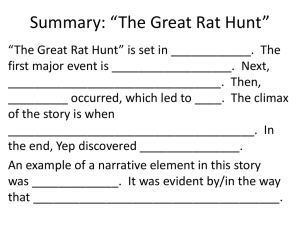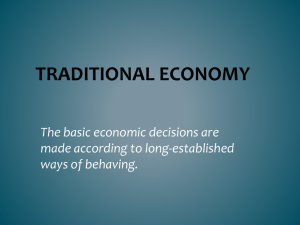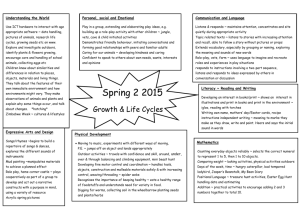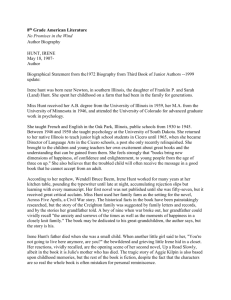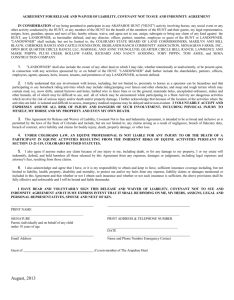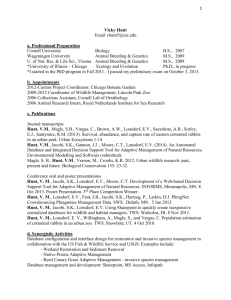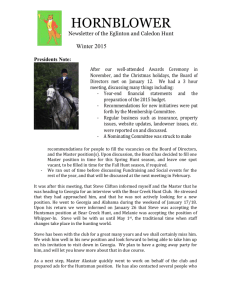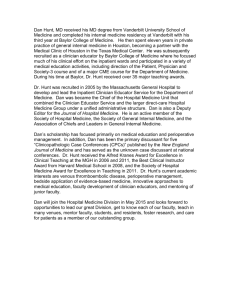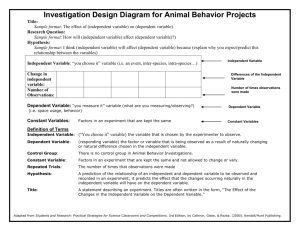Anderson, Paul F., (1983). “Marketing, Scientific Progress, and the
advertisement
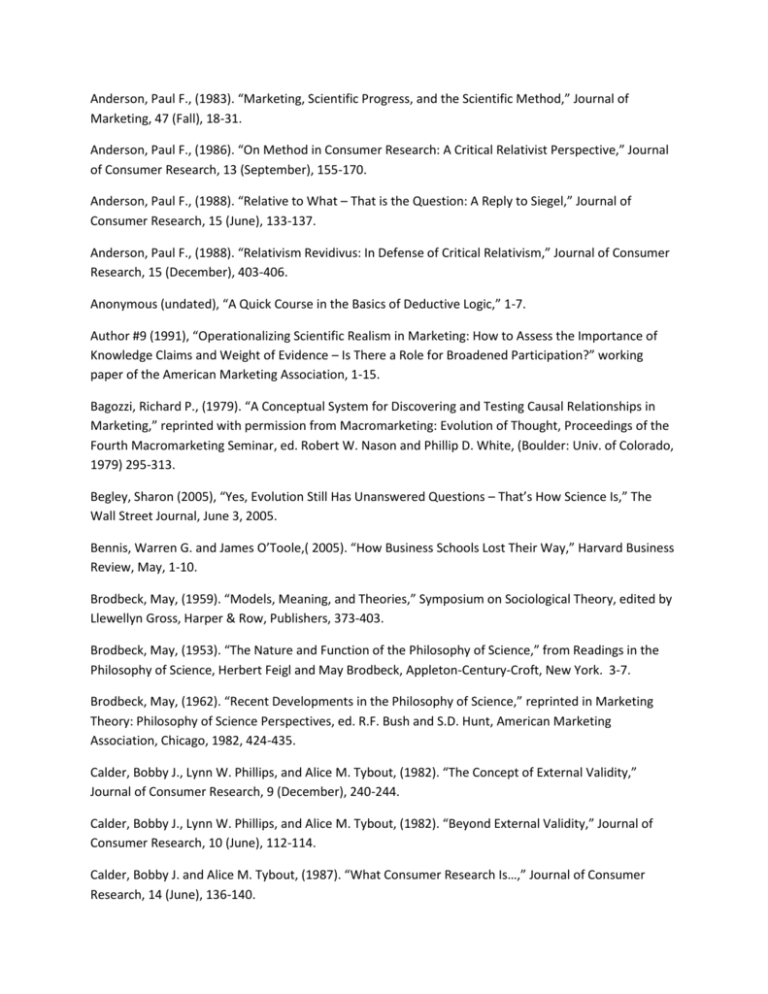
Anderson, Paul F., (1983). “Marketing, Scientific Progress, and the Scientific Method,” Journal of Marketing, 47 (Fall), 18-31. Anderson, Paul F., (1986). “On Method in Consumer Research: A Critical Relativist Perspective,” Journal of Consumer Research, 13 (September), 155-170. Anderson, Paul F., (1988). “Relative to What – That is the Question: A Reply to Siegel,” Journal of Consumer Research, 15 (June), 133-137. Anderson, Paul F., (1988). “Relativism Revidivus: In Defense of Critical Relativism,” Journal of Consumer Research, 15 (December), 403-406. Anonymous (undated), “A Quick Course in the Basics of Deductive Logic,” 1-7. Author #9 (1991), “Operationalizing Scientific Realism in Marketing: How to Assess the Importance of Knowledge Claims and Weight of Evidence – Is There a Role for Broadened Participation?” working paper of the American Marketing Association, 1-15. Bagozzi, Richard P., (1979). “A Conceptual System for Discovering and Testing Causal Relationships in Marketing,” reprinted with permission from Macromarketing: Evolution of Thought, Proceedings of the Fourth Macromarketing Seminar, ed. Robert W. Nason and Phillip D. White, (Boulder: Univ. of Colorado, 1979) 295-313. Begley, Sharon (2005), “Yes, Evolution Still Has Unanswered Questions – That’s How Science Is,” The Wall Street Journal, June 3, 2005. Bennis, Warren G. and James O’Toole,( 2005). “How Business Schools Lost Their Way,” Harvard Business Review, May, 1-10. Brodbeck, May, (1959). “Models, Meaning, and Theories,” Symposium on Sociological Theory, edited by Llewellyn Gross, Harper & Row, Publishers, 373-403. Brodbeck, May, (1953). “The Nature and Function of the Philosophy of Science,” from Readings in the Philosophy of Science, Herbert Feigl and May Brodbeck, Appleton-Century-Croft, New York. 3-7. Brodbeck, May, (1962). “Recent Developments in the Philosophy of Science,” reprinted in Marketing Theory: Philosophy of Science Perspectives, ed. R.F. Bush and S.D. Hunt, American Marketing Association, Chicago, 1982, 424-435. Calder, Bobby J., Lynn W. Phillips, and Alice M. Tybout, (1982). “The Concept of External Validity,” Journal of Consumer Research, 9 (December), 240-244. Calder, Bobby J., Lynn W. Phillips, and Alice M. Tybout, (1982). “Beyond External Validity,” Journal of Consumer Research, 10 (June), 112-114. Calder, Bobby J. and Alice M. Tybout, (1987). “What Consumer Research Is…,” Journal of Consumer Research, 14 (June), 136-140. Calder, Bobby J. and Alice M. Tybout, (1999). “A Vision of Theory, Research, and the Future of Business Schools,” Journal of the Academy of Marketing Science, 27 (3), 359-366. Cochran, Thomas C. The American Business System: A Historical Perspectives 1900-1955, Harper Torchbooks, Chapters 1-5, 1-100. Cooper, Lee G. (1987), “Do We Need Critical Relativism? Comments On ‘Method in Consumer Research’,” Journal of Consumer Research, 14 (June), 126-127. Deshpande, Rohit (1983), “Paradigms Lost: On Theory and Method in Research in Marketing,” Journal of Marketing, 47 (Fall), 101-110. Davis, Bob (2004), “Finding Lessons of Outsourcing in 4 Historical Tales,” Wall Street Journal, March 29, 2004, Section A8. Elhug, Ezhan (handwritten notes), “The Construction of Scientific Meaning,” Fischer, Robert B. (1975), Definitions of Science, from Science, Man, and Society, 2nd Ed. (Philadelphia: W.B. Saunders), 34-37. Gaski, John F. (1985), “Nomic Necessity In Marketing Theory: The Issue of Counterfactual Conditionals,” Journal of the Academy of Marketing Science, 13 (2), 310-320. Golder, Peter N. (2000), “Historical Method in Marketing Research with New Evidence on Long-Term Market Share Stability,” Journal of Marketing Research, XXXVII (May), 156-172. Hays, Samuel P. (1957), The Response to Industrialism: 1885-1914, part 1 (University of Chicago Press), 1-95. Hays, Samuel P. (1957), The Response to Industrialism: 1885-1914, part 2 (University of Chicago Press), 96-212. Hirschman, Elizabeth C. (1986), “Humanistic Inquiry In Marketing Research: Philosophy, Method, and Criteria,” Journal of Marketing Research, XXIII (August), 237-249. Hudson, Laurel Anderson and Julie L. Ozanne (1988), “Alternative Ways of Seeking Knowledge in Consumer Research,” Journal of Consumer Research, 14 (March), 508-521. Hunt, Shelby D. (1990), “Truth in Marketing Theory and Research,” Journal of Marketing, 54 (July), 1-15. Hunt, Shelby D. (1991), “Positivism and Paradigm Dominance in Consumer Research: Toward Critical Pluralism and Rapprochment,” Journal of Consumer Research, 18 (June), 32-43. Hunt, Shelby D. (1992), “For Reason and Realism in Marketing,” Journal of Marketing, 56 (April), 89-102. Hunt, Shelby D. (1993), “Objectivity in Marketing Theory and Research,” Journal of Marketing, 57 (April), 76-91. Hunter, John E. (2001), “The Desperate Need for Replications,” Journal of Consumer Research, 28 (June), 149-158. Johnson, Denis B. (1980), “Bond Street: Methodological Issues Relating to the Evolution of a High-Order Shopping Street,” presented at Workshop in Historical Research in Marketing. Lee. Allen S. (1991), ”Integrating Positivist and Interpretive Approaches to Organizational Research,” Organization Science, 2 (4), 342-365. Lynch, Jr., John G. (1982), “On the External Validity of Experiments in Consumer Research,” Journal of Consumer Research, 9 (December), 225-239. Lynch, Jr., John G. (1983), “The Role of External Validity in Theoretical Research,” Journal of Consumer Research, 10 (June), 109-111. Lynch, Jr., John G. (1999), “Theory and External Validity,” Journal of the Academy of Marketing Science, 27 (3), 367-376. McGrath, Joseph E. and David Brinberg (1983), “External Validity and the Research Process: A Comment on the Calder/Lynch Dialogue,” Journal of Consumer Research, 10 (June), 115-124. Muncy, James A. and Raymond P. Fisk (1987), “Cognitive Relativism and the Practice of Marketing Science,” Journal of Marketing, 51 (January), 20-33. Nevett, Terence (1991), “Historical Investigation and the Practice of Marketing,” Journal of Marketing, 55 (July), 13-23. Olson, Jerry C. (1981), “Presidential Address – 1981: Toward a Science of Consumer Behavior,”reprinted from Proceedings of 1981 Association for Consumer Research Conference, 395-404. Olson, Jerry (1987), “The Construction of Scientific Meaning,” play in one act, 384-388. Peter, J. Paul and Jerry Olson (1983), “Is Science Marketing?” Journal of Marketing, 47 (Fall), 111-125. Peter, J. Paul (1992), “Realism or Relativism for Marketing Theory and Research: A Comment on Hunt’s ‘Scientific Realism’,” Journal of Marketing, 56 (April), 72-79. Savitt, Ronald (1980), “Historical Research in Marketing,” Journal of Marketing, 44 (Fall), 52-58. Schmidt, Vivien (1987), “Four Approaches to Science and Their Implications for Organizational Theory and Research,” Knowledge: Creation, Diffusion, Utilization, 9 (1), 19-41. Siegel, Harvey (1988), “Relativism for Consumer Research? (Comments on Anderson),” Journal of Consumer Research, 15 (June), 129-132. Smith, Ruth Ann and David S. Lux (1993), “Historical Method in Consumer Research: Developing Causal Explanations of Change,” Journal of Consumer Research, 19 (March), 595-607. Thompson, Craig J., William B. Locander, and Howard R. Pollio (1989), “Putting Consumer Experience Back into Consumer Research: The Philosophy and Method of Existential-Phenomenology,” Journal of Consumer Research, 16 (), 133-146. Thompson, Craig J., Howard R. Pollio, and William B. Locander (1994), “The Spoken and the Unspoken: A Hermeneutic Approach to Understanding the Cultural Viewpoints that Underlie Consumers’ Expressed Meanings,” Journal of Consumer Research, 21 (December), 432-451. Unknown (), “Logic: Inductive Justification,” Chapter 7, Common Sense Logic, 199-236. Unknown (), “Logic: Inductive Justification,” Chapter 7, Common Sense Logic, 237-265. Varadarajan, P. Rajan (2003), “Musings on Relevance and Rigor of Scholarly Research in Marketing,” Journal of the Academy of Marketing Science, 31 (4), 368-376. Winer, Russell S. (1999), “Experimentation in the 21st Century: The Importance of External Validity,” Journal of the Academy of Marketing Science, 27 (3), 349-358. Zinkhan, George M. and Rudy Hirschheim (1992), “Truth in Marketing Theory and Research: An Alternative Perspective,” Journal of Marketing, 56 (April), 80-88. BSAD 6310 – Foundations of Scientific Inquiry Fall, 2008 Reading List Sequence September 8 – Historical Perspective Hays, Samuel P. (1957), The Response to Industrialism: 1885-1914, part 1 (Chapters 1-5) (University of Chicago Press), 1-95. Hays, Samuel P. (1957), The Response to Industrialism: 1885-1914, part 2 (Chapters 6-9) (University of Chicago Press), 96-212. September 15 – Historical Research Cochran, Thomas C. The American Business System: A Historical Perspectives 1900-1955, Harper Torchbooks, Chapters 1-5, 1-100. Savitt, Ronald (1980), “Historical Research in Marketing,” Journal of Marketing, 44 (Fall), 52-58. Nevett, Terence (1991), “Historical Investigation and the Practice of Marketing,” Journal of Marketing, 55 (July), 13-23. Smith, Ruth Ann and David S. Lux (1993), “Historical Method in Consumer Research: Developing Causal Explanations of Change,” Journal of Consumer Research, 19 (March), 595-607. Golder, Peter N. (2000), “Historical Method in Marketing Research with New Evidence on Long-Term Market Share Stability,” Journal of Marketing Research, XXXVII (May), 156-172. Davis, Bob (2004), “Finding Lessons of Outsourcing in 4 Historical Tales,” Wall Street Journal, March 29, 2004, Section A8. September 22 – Deductive Logic Hunt book 2002, Chapter 1 Anonymous (undated), “A Quick Course in the Basics of Deductive Logic,” 1-7. Unknown (), “Logic: Inductive Justification,” Chapter 7, Common Sense Logic, 199236. Unknown (), “Logic: Inductive Justification,” Chapter 7, Common Sense Logic, 237265. Fischer, Robert B. (1975), Definitions of Science, from Science, Man, and Society, 2nd Ed. (Philadelphia: W.B. Saunders), 34-37. Hunt book 2002, Chapter 3 Brodbeck, May, (1959). “Models, Meaning, and Theories,” Symposium on Sociological Theory, edited by Llewellyn Gross, Harper & Row, Publishers, 373-403. Brodbeck, May, (1953). “The Nature and Function of the Philosophy of Science,” from Readings in the Philosophy of Science, Herbert Feigl and May Brodbeck, Appleton-Century-Croft, New York. 3-7. Hunt book 2002, Chapter 4 September 29 – Causal Relationships Bagozzi, Richard P., (1979). “A Conceptual System for Discovering and Testing Causal Relationships in Marketing,” reprinted with permission from Macromarketing: Evolution of Thought, Proceedings of the Fourth Macromarketing Seminar, ed. Robert W. Nason and Phillip D. White, (Boulder: Univ. of Colorado, 1979) 295-313. Hunt book 2002, Chapter 5 Gaski, John F. (1985), “Nomic Necessity In Marketing Theory: The Issue of Counterfactual Conditionals,” Journal of the Academy of Marketing Science, 13 (2), 310-320. Hunt book 2002, Chapter 6 Hunt book 2002, Chapter 7 Weick, Karl E. (1999), “What Theory is Not, Theorizing Is,” Administrative Science Quarterly, 44 (3), 385-390. Hunter, John E. (2001), “The Desperate Need for Replications,” Journal of Consumer Research, 28 (June), 149-158. Varadarajan, P. Rajan (2003), “Musings on Relevance and Rigor of Scholarly Research in Marketing,” Journal of the Academy of Marketing Science, 31 (4), 368376. October 6 – External Validity Lynch, Jr., John G. (1982), “On the External Validity of Experiments in Consumer Research,” Journal of Consumer Research, 9 (December), 225-239. Calder, Bobby J., Lynn W. Phillips, and Alice M. Tybout, (1982). “The Concept of External Validity,” Journal of Consumer Research, 9 (December), 240-244. Lynch, Jr., John G. (1983), “The Role of External Validity in Theoretical Research,” Journal of Consumer Research, 10 (June), 109-111. Calder, Bobby J., Lynn W. Phillips, and Alice M. Tybout, (1982). “Beyond External Validity,” Journal of Consumer Research, 10 (June), 112-114. McGrath, Joseph E. and David Brinberg (1983), “External Validity and the Research Process: A Comment on the Calder/Lynch Dialogue,” Journal of Consumer Research, 10 (June), 115-124. Winer, Russell S. (1999), “Experimentation in the 21st Century: The Importance of External Validity,” Journal of the Academy of Marketing Science, 27 (3), 349-358. Calder, Bobby J. and Alice M. Tybout, (1999). “A Vision of Theory, Research, and the Future of Business Schools,” Journal of the Academy of Marketing Science, 27 (3), 359-366. Lynch, Jr., John G. (1999), “Theory and External Validity,” Journal of the Academy of Marketing Science, 27 (3), 367-376. October 13 – Philosophy of Science Hunt book 2002, Chapter 8 Hunt book 2003, Chapter 2 sections 2.1-2.3.3 Hunt book 2003, Chapter 2 sections 2.4-2.5.2 Hunt book 2003, Chapter 3 sections 3.1-3.3 Hunt book 2003, Chapter 3 sections 3.4-3.6 Hunt book 2003, Chapter 4 sections 4.1-4.2.1 Hunt book 2003, Chapter 4 sections 4.2.2-4.3 Hunt book 2003, Chapter 5 sections 5.1-5.2.1 Hunt book 2003, Chapter 5 sections 5.2.2-5.4 October 20 – Philosophy of Science continued Hunt book 2003, Chapter 6 sections 6.1-6.2.1 Hunt book 2003, Chapter 6 sections 6.2.2-6.2.6 Hunt book 2003, Chapter 7 sections 7.1-7.4.2 Hunt book 2003, Chapter 7 sections 7.4.3-7.8.1 Hunt book 2003, Chapter 8 sections 8.1-8.3 Hunt book 2003, Chapter 8 sections 8.4-8.5 Hunt book 2003, Chapter 9 sections 9.1-9.2 Hunt book 2003, Chapter 9 sections 9.3-9.4 October 27 – Scientific Meaning Peter, J. Paul and Jerry Olson (1983), “Is Science Marketing?” Journal of Marketing, 47 (Fall), 111-125. Olson, Jerry (1987), “The Construction of Scientific Meaning,” play in one act, 384388. No review – everybody just read this Elhug, Ezhan (handwritten notes), “The Construction of Scientific Meaning,” Deshpande, Rohit (1983), “Paradigms Lost: On Theory and Method in Research in Marketing,” Journal of Marketing, 47 (Fall), 101-110. Anderson, Paul F., (1983). “Marketing, Scientific Progress, and the Scientific Method,” Journal of Marketing, 47 (Fall), 18-31. Hirschman, Elizabeth C. (1986), “Humanistic Inquiry In Marketing Research: Philosophy, Method, and Criteria,” Journal of Marketing Research, XXIII (August), 237-249. Anderson, Paul F., (1986). “On Method in Consumer Research: A Critical Relativist Perspective,” Journal of Consumer Research, 13 (September), 155-170. Siegel, Harvey (1988), “Relativism for Consumer Research? (Comments on Anderson),” Journal of Consumer Research, 15 (June), 129-132. Cooper, Lee G. (1987), “Do We Need Critical Relativism? Comments On ‘Method in Consumer Research’,” Journal of Consumer Research, 14 (June), 126-127. Anderson, Paul F., (1988). “Relative to What – That is the Question: A Reply to Siegel,” Journal of Consumer Research, 15 (June), 133-137. Hudson, Laurel Anderson and Julie L. Ozanne (1988), “Alternative Ways of Seeking Knowledge in Consumer Research,” Journal of Consumer Research, 14 (March), 508-521. November 10 – Realism and Research Calder, Bobby J. and Alice M. Tybout, (1987). “What Consumer Research Is…,” Journal of Consumer Research, 14 (June), 136-140. Muncy, James A. and Raymond P. Fisk (1987), “Cognitive Relativism and the Practice of Marketing Science,” Journal of Marketing, 51 (January), 20-33. Anderson, Paul F., (1988). “Relativism Revidivus: In Defense of Critical Relativism,” Journal of Consumer Research, 15 (December), 403-406. Hunt, Shelby (1984), “Should Marketing Adopt Relativism?” Proceedings from the American Marketing Association Winter Educators’ Conference, 30-55. (Chapter 11, Appendix A) Ewald, William (2006), “No, Everything Isn’t Relative,” Wall Street Journal – Eastern Edition, 248 (117), D6. Hunt: Naturalism (Chapter 11, Appendix B) Brodbeck, May, (1962). “Recent Developments in the Philosophy of Science,” reprinted in Marketing Theory: Philosophy of Science Perspectives, ed. R.F. Bush and S.D. Hunt, American Marketing Association, Chicago, 1982, 424-435. Hunt: Reification (Chapter 11, Appendix C) Hunt, Shelby D. (1990), “Truth in Marketing Theory and Research,” Journal of Marketing, 54 (July), 1-15. Hunt, Shelby D. (1991), “Positivism and Paradigm Dominance in Consumer Research: Toward Critical Pluralism and Rapprochment,” Journal of Consumer Research, 18 (June), 32-43. November 24 – Integration Approaches Zinkhan, George M. and Rudy Hirschheim (1992), “Truth in Marketing Theory and Research: An Alternative Perspective,” Journal of Marketing, 56 (April), 80-88. Author #9 (1991), “Operationalizing Scientific Realism in Marketing: How to Assess the Importance of Knowledge Claims and Weight of Evidence – Is There a Role for Broadened Participation?” working paper of the American Marketing Association, 115. Peter, J. Paul (1992), “Realism or Relativism for Marketing Theory and Research: A Comment on Hunt’s ‘Scientific Realism’,” Journal of Marketing, 56 (April), 72-79. Hunt, Shelby D. (1992), “For Reason and Realism in Marketing,” Journal of Marketing, 56 (April), 89-102. Lee. Allen S. (1991), ”Integrating Positivist and Interpretive Approaches to Organizational Research,” Organization Science, 2 (4), 342-365. Hunt, Shelby D. (1993), “Objectivity in Marketing Theory and Research,” Journal of Marketing, 57 (April), 76-91. Olson, Jerry C. (1981), “Presidential Address – 1981: Toward a Science of Consumer Behavior,”reprinted from Proceedings of 1981 Association for Consumer Research Conference, 395-404. Begley, Sharon (2005), “Yes, Evolution Still Has Unanswered Questions – That’s How Science Is,” The Wall Street Journal, June 3, 2005. Schmidt, Vivien (1987), “Four Approaches to Science and Their Implications for Organizational Theory and Research,” Knowledge: Creation, Diffusion, Utilization, 9 (1), 19-41. Johnson, Denis B. (1980), “Bond Street: Methodological Issues Relating to the Evolution of a High-Order Shopping Street,” presented at Workshop in Historical Research in Marketing. December 1 – Hermeneutics and Assorted Topics Thompson, Craig J., William B. Locander, and Howard R. Pollio (1989), “Putting Consumer Experience Back into Consumer Research: The Philosophy and Method of Existential-Phenomenology,” Journal of Consumer Research, 16 (), 133-146. Thompson, Craig J., Howard R. Pollio, and William B. Locander (1994), “The Spoken and the Unspoken: A Hermeneutic Approach to Understanding the Cultural Viewpoints that Underlie Consumers’ Expressed Meanings,” Journal of Consumer Research, 21 (December), 432-451. Sitz. Lionel (2008), “Beyond Semiotics and Hermeneutics: Discourse Analysis as a Way to Interpret Consumers’ Discourses and Experiences,” Qualitative Market Research: An International Journal, 11 (2), 177-191. Bennis, Warren G. and James O’Toole,( 2005). “How Business Schools Lost Their Way,” Harvard Business Review, May, 1-10. Schmalensee, Richard (2006), “Where’s the B in B-Schools?” Business Week, 4011. Seven Commentaries
